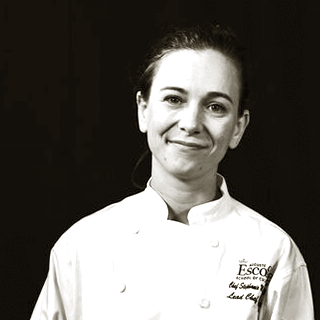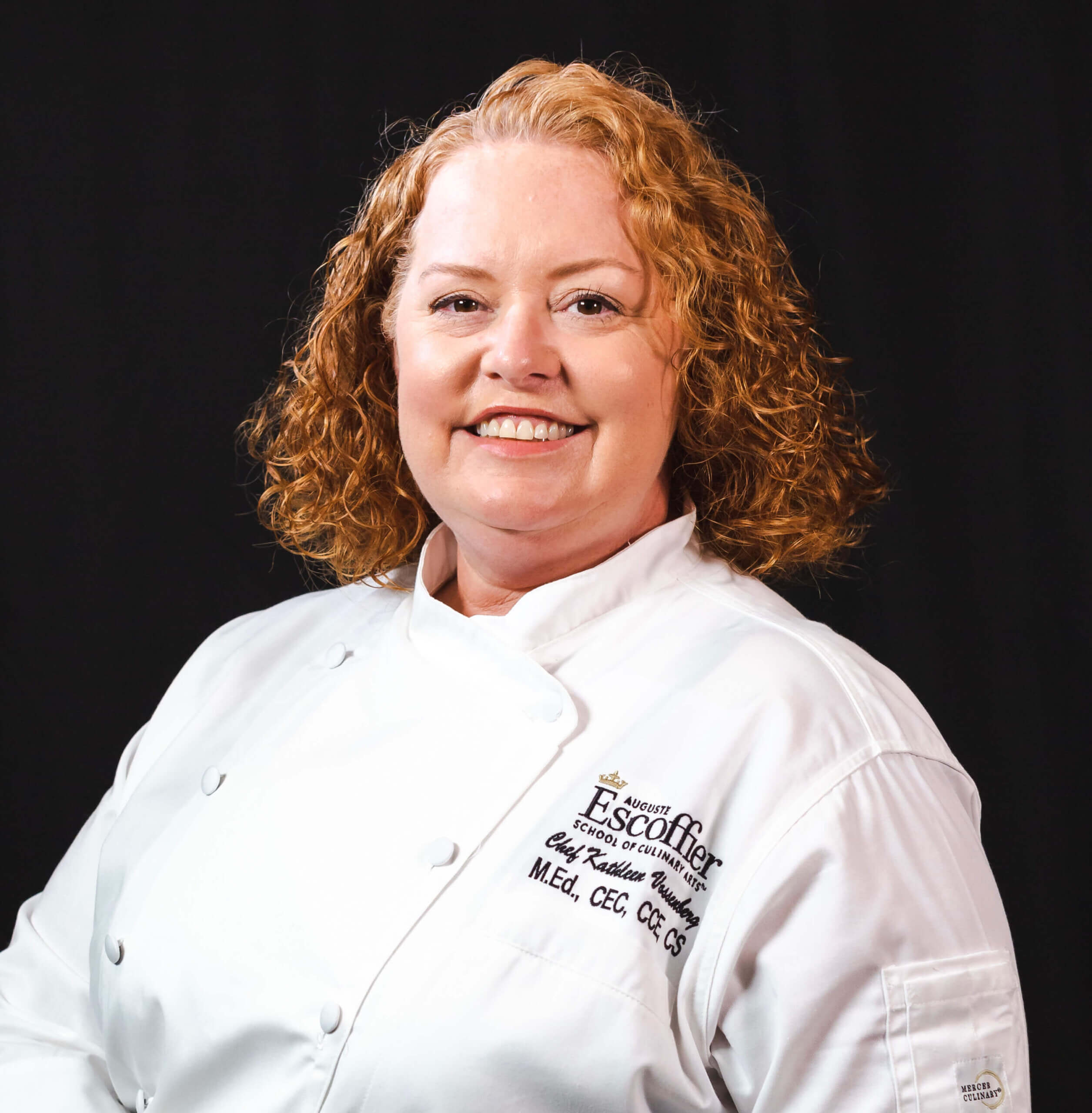Listen to This Article:
Deciding to earn your culinary arts degree could be a great first step toward building the career and life you’ve always wanted. But as you explore different schools and programs, your options can quickly get a bit confusing.
Culinary school or community college? Bachelor’s degree? Associates degree? Diploma? Which school and which program can help get you closest to your goals? And what are the differences between them?
The variety of programs in food and hospitality education means that no matter where you want to end up in the culinary industry, there’s a path to help you get there! Keep reading to discover more about the types of culinary arts degrees and diplomas, and which could be right for your goals.
Get a Fast Education with a Culinary Diploma
A culinary diploma or degree signifies that a student has invested time to successfully complete a course of study from a food or hospitality-focused program.
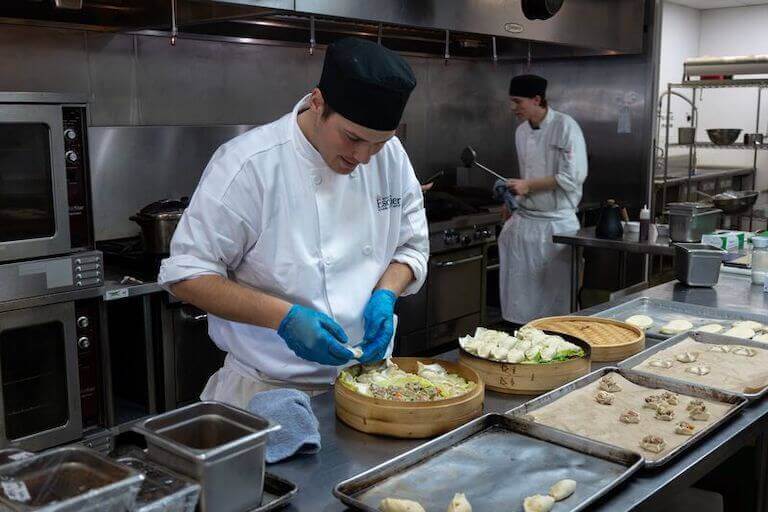
Escoffier student at Boulder campus engaging in the culinary curriculum.
Diploma programs are usually shorter than degree programs since they don’t include certain requirements like science or math courses. At Escoffier, our on-campus diploma programs can be completed in just 30 weeks, including a hands-on industry externship. Online diploma programs take 60 weeks, but they also offer greater flexibility since students can complete their coursework on their own time, as long as they meet scheduled deadlines. Many online students even continue to work full-time. Diploma programs can be less expensive than degree programs. With the shorter time requirement, flexible online programs, and lower cost, culinary diplomas are great for students who want to get to work as soon as possible.
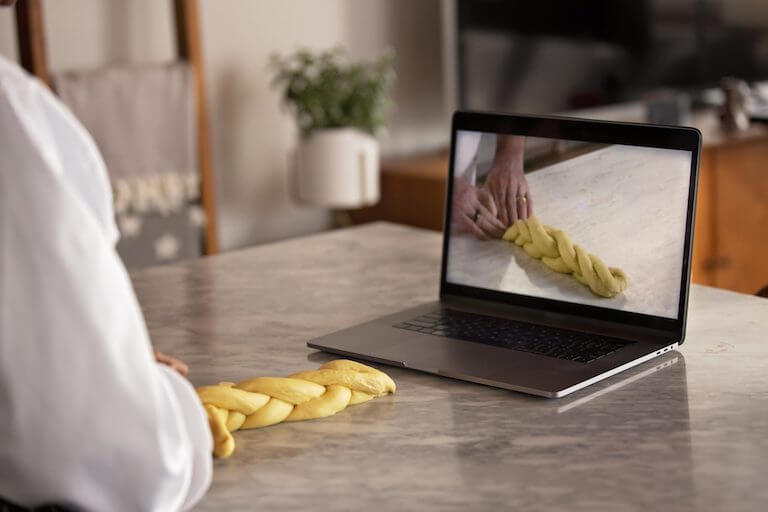
Person at a laptop learning to make bread.
Culinary diplomas are usually focused on culinary arts or baking & pastry arts. Culinary arts students could explore classical and contemporary culinary techniques, world cuisines, breakfast, charcuterie, garde manger, and more. This is a broader culinary education and can help prepare students for entry-level jobs in restaurants, hotels, and catering companies or could help those already working in the industry advance in their careers. If you hope to one day become a chef, an education in culinary arts can be a good place to start.
Baking and pastry students could focus on artisanal breads, cake decorating, pies, tarts, and other baked goods. These programs can help prepare students for their first jobs in bakeries or as entry-level pastry cooks.
Students at Escoffier can also start preparing for the business side of the culinary industry with Escoffier’s Food Entrepreneurship online, 60-week diploma program. This coursework can help aspiring entrepreneurs start a food truck, restaurant, bakery, E-commerce business, and many more paths. Students can also explore a vast array of traditional and digital marketing concepts, business planning methods, and core culinary principles.
For students interested in holistic health, coaching, and how food affects our overall well-being, Escoffier offers an Online Holistic Nutrition and Wellness Diploma program. Students can explore how to create nutrient-dense meals and examine ways to help clients achieve their overall wellness goals.
In addition to these programs, students who exude a passion for plant-based foods can enroll in Escoffier’s Online Plant-Based Culinary Arts Diploma or Plant-Based Cuisine Diploma programs. This curriculum may highlight things like essential plant-based cooking techniques, cultural plant-based cuisine, seasonal menu planning, and much more!
Escoffier offers the following diplomas:
Diploma in Culinary Arts (Austin and Boulder Campuses)
Diploma in Pastry Arts (Austin and Boulder Campuses)
Diploma in Culinary Arts and Operations (Online)
Diploma in Professional Pastry Arts (Online)
Diploma in Plant-Based Culinary Arts (Online)
Diploma in Plant-Based Cuisine (Boulder Campus)
Diploma in Holistic Nutrition and Wellness (Online)
Diploma in Food Entrepreneurship (Online)
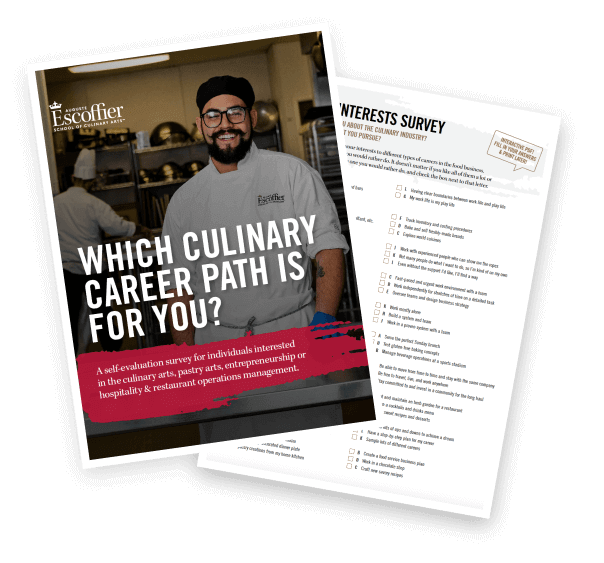
Take the Culinary Career Survey
We’ve compiled a checklist of all of the essential questions into one handy tool: career options, culinary interest surveys, educational opportunities, and more.
Get an In-Depth Education with a Culinary Degree
To receive an associate degree, students must complete both culinary training and some lecture classes and coursework in subjects like English and math. At a community college, these types of classes will usually be somewhat generic, since they’ll be taken by students from all different specializations.
At Escoffier, the broader requirements for an associate degree are satisfied with culinary-specific courses, like Technical Writing for the Hospitality Industry, The Science of Nutrition, and Foodservice Math & Accounting**. This industry-specific training can be particularly valuable to students who hope to become managers or own their own culinary businesses one day.
In addition to the lecture courses, associate degree programs may include additional coursework or have longer externship requirements. This is why these programs are usually longer than diploma programs. They can take up to two years, although at Escoffier, culinary arts degree programs can be completed in 60-84 weeks.
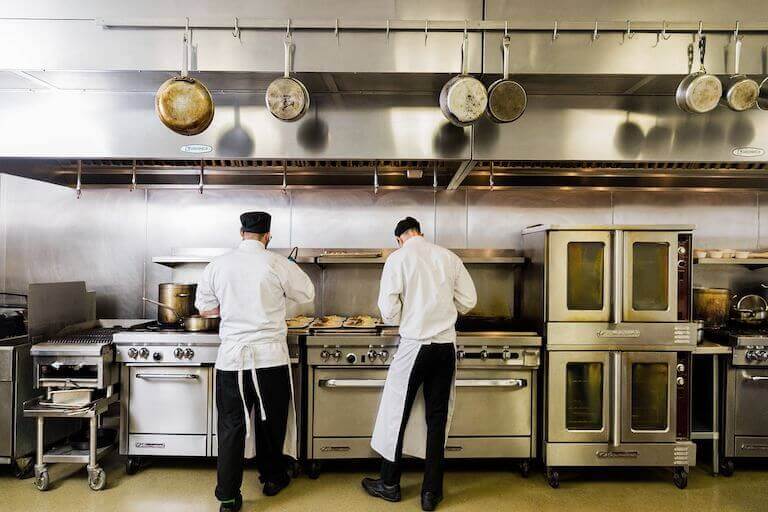
Two Escoffier students assembling plates as part of the culinary degree program
Escoffier offers the following degrees:
Associate of Applied Science Degree in Culinary Arts (Austin Campus)
Associate of Applied Science Degree in Pastry Arts (Austin Campus)
Associate of Occupational Studies Degree in Culinary Arts (Boulder Campus & Online)
Associate of Occupational Studies Degree in Baking and Pastry (Boulder Campus & Online)
Associate of Occupational Studies Degree in Hospitality & Restaurant Operations Management (Online)
Associate of Occupational Studies Degree in Plant-Based Culinary Arts (Online)
Associate of Occupational Studies Degree in Holistic Nutrition and Wellness (Online)
Associate of Occupational Studies Degree in Food Entrepreneurship (Online)
Why Accreditation Counts
Not all culinary schools are accredited. Accreditation is provided by neutral third parties to certify that a curriculum and quality of education meet certain pre-set criteria. These standards can help students assess the credentials of the college and the quality of education they can receive there. Along with these high standards, attending an accredited school could lead to better job prospects down the line as well.
Accreditation is also a requirement for students to be eligible for federal financial aid. So any student who needs some sort of tuition assistance should consider accredited schools that also participate in Title IV funding (federal financial aid).
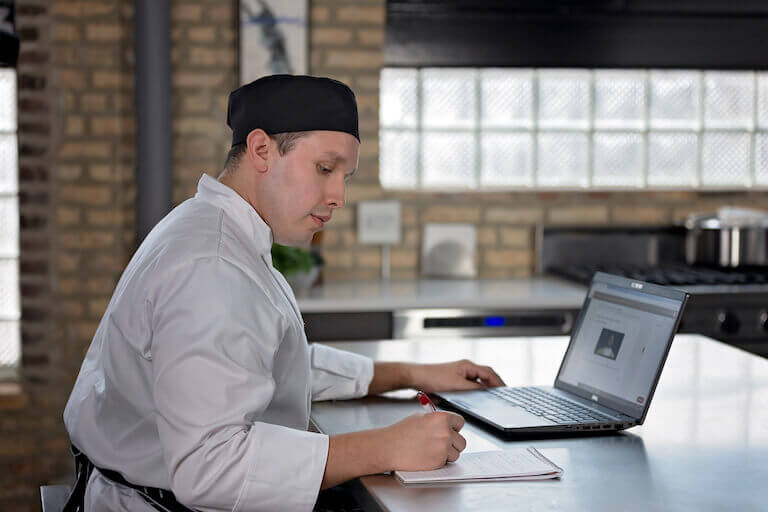
Accreditation can be crucial when applying for financial aid.
Escoffier’s Boulder campus, which also offers online programs, is nationally accredited by the Accrediting Council for Continuing Education and Training (ACCET).
It’s also approved and regulated by the Colorado Department of Higher Education (CDHE), Division of Private Occupational Schools. Escoffier in Boulder has been approved by CDHE to participate in the National Council for State Authorization Reciprocity Agreements (NC-SARA).
The Diploma in Pastry Arts, Diploma in Culinary Arts, and Associate Degree in Culinary Arts (residential only) programs are accredited by the American Culinary Federation Educational Foundation Accrediting Commission.
Escoffier’s Austin campus is nationally accredited by the Commission of the Council on Occupational Education. It’s also approved and regulated by the Texas Workforce Commission-Career Schools and Colleges, and is authorized as an Associate of Applied Science degree–granting institution through the Texas Higher Education Coordinating Board.
The Diploma in Culinary Arts, Diploma in Pastry Arts, Associate Degree in Culinary Arts, and Associate Degree in Baking and Pastry Arts programs in Austin are all accredited by the American Culinary Federation Educational Foundation Accrediting Commission.
Which Program Is Right for You?
There’s a lot to consider when choosing between degrees and diplomas, on-campus and online!
To learn more about the different programs offered at Escoffier, contact us today. We can help you assess the programs and decide which one will be the best choice to help you get where you want to go.
WANT TO LEARN MORE ABOUT CULINARY EDUCATION? TRY THESE ARTICLES NEXT:
- What to Expect When You Attend Culinary School
- 7 Reasons to Get an Online Hospitality Degree
- 6 Benefits of Studying at a Top Culinary Institute
This article was originally published on March 17, 2021, and has since been updated.
*Information may not reflect every student’s experience. Results and outcomes may be based on several factors, such as geographical region or previous experience.
**Items may vary depending on the program and location.

